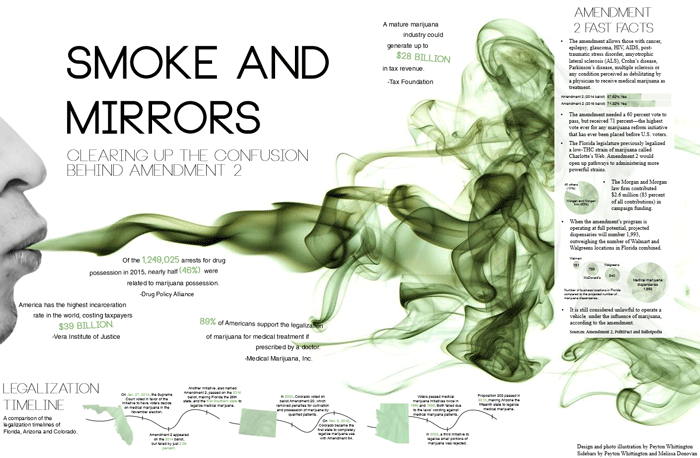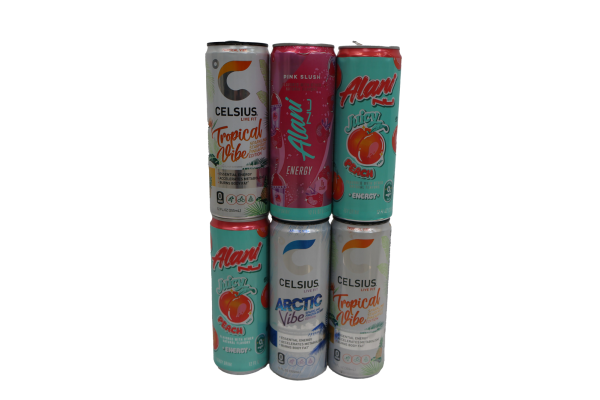Smoke and mirrors
Clearing up the confusion behind Amendment 2
photo by Peyton Whittington
When Amendment 2 passed with 71 percent of the vote on Nov. 8, allowing the prescription of marijuana for debilitating conditions, Floridians celebrated by taking to Twitter with invitations to light up together. Despite the jokes that followed, the amendment is fairly clear and limited. Even so, it has raised questions as to the future status of recreational marijuana in Florida since Colorado passed a very similar bill in 2000.
Some like senior Jaime Monroe* celebrated the passage of the amendment because it meant they would be able to have better access to needed medical treatment. Monroe suffers from insomnia and has tried medications ranging from Trazodone to Xanax, but all made her sleep more than she wanted and left her feeling groggy. Monroe found that the sedative effect of marijuana helped regulate her sleeping pattern, so she began using it.
“The process illegally is a lot of trying to find trust in people so you’re not getting bad stuff… because it’s dangerous,” Monroe said.
Monroe once used some marijuana that was combined with an unknown chemical to make it weigh more. The side effects landed her in the hospital with a low heart rate and blood pressure.
“I think people should take that experience and realize that could have been avoided if [ I ] could have just gone to a dispensary,” Monroe said. “You’re putting so much more at risk when you’re getting it on the street.”
Before the amendment, the ramifications of the possession of marijuana could be as intense as being charged with a felony. According to Oviedo police officer Edward Genao, the way cases of marijuana possession and distribution are handled will not change for people who possess it without the proper license or prescription.
“To put it simply, view it as pain killers. With a prescription, it’s fine, but abuse and misuse are illegal, and the amendment doesn’t change that,” Genao said.
Possession of less than 20 grams is viewed as a second degree misdemeanor, and attempting to destroy it by swallowing or flushing it down a toilet results in a felony for tampering with evidence. Possessing more than 20 grams or selling marijuana also resulted in a felony charge. Now, those who are handling marijuana with prescriptions and licenses will not face these ramifications, but those who do not will.
Amendment 2 does not mean anyone will have access to marijuana for recreational purposes, as it is strictly for medical use only. There is a very specific process for patients wishing to have access to medical marijuana.
First, a patient must receive a physician’s certification debilitating medical condition by a licensed physician. The amendment lists 10 specific conditions (cancer, epilepsy, glaucoma, HIV, AIDS, PTSD, multiple sclerosis, ALS, Crohn’s disease and multiple sclerosis) but also allows individual physicians to determine what is a debilitating condition.
Senior Kim Ariza hopes medical marijuana will help reduce her daily pain. In 2014, Ariza was diagnosed with ulcerative colitis, a form of irritable bowel disease with symptoms including arthritis, stomach pain, insomnia, and depression. IBD takes two forms: Crohn’s Disease and ulcerative colitis. Ulcerative colitis is not listed in the amendment, but if a physician deems it debilitating, Ariza can receive a physician’s certification.
“I talked about it with my parents. They weren’t too happy about it, but I think when I get older and I get a new doctor, I will definitely bring it up,” Ariza said.
After a patient has received a physician’s certification, they can apply for an identification card from the Department of Health that will allow them to receive marijuana from a Medical Marijuana Treatment Center. An MMTC is a licensed facility that distributes marijuana products and materials for patients and caregivers. MMTCs cannot serve patients who do not have the proper identification card.
“To responsibly legalize medical marijuana, you’ve got to create an industry to serve the patients that are becoming legal medicinal marijuana users,” United For Care campaign manager Ben Pollara said. United For Care advocated for Amendment 2 before the Nov. 8 vote.
There has been some concern over the wording of the amendment. The Florida Conference of Catholic Bishops released a statement before the election highlighting the “opportunities for fraud and abuse” the amendment could potentially allow. Other opponents included the Drug Free Florida Committee and the Florida Sheriffs Association. Pollara stresses that the amendment will not allow abuse while permitting doctors to treat patients as they see fit.
“We can talk about the political stuff, but I think at the core [Amendment 2 passed] because Floridians are compassionate, and they trust their doctors. That’s ultimately what this amendment is about and that’s why it got such broad support,” Pollara said.
Medical marijuana will not be available until at least six months into 2017.
*Name has been changed
Click here to read the full text of Amendment 2: http://www.unitedforcare.org/ballot_language
Your donation will support the student journalists of Hagerty High School. We are an ad-free publication, and your contribution helps us publish six issues of the BluePrint and cover our annual website hosting costs. Thank you so much!







